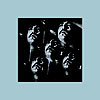Jim Sullivan, UFO Reissue
Published on January 13th, 2011 in: Music, Music Reviews, Retrovirus, Reviews |By Chelsea Spear

As with so many other albums, the reissue of Jim Sullivan’s UFO came complete with a compelling back-story.
Sullivan, a purveyor of folk-inflected pop, spent the 1960s playing in LA nightclubs, making time with outlaw movie stars like Harry Dean Stanton and Dennis Hopper, and appearing on The Jose Feliciano Hour and in the movie Easy Rider. In early 1970, he recorded the album UFO with the Wrecking Crew, which his friend Al Dobbs released as a private pressing on his Monnie Records label. When the album failed to gain traction with those in the industry, Sullivan attempted a move to Nashville to work as a professional songwriter. He mysteriously disappeared at a stop in Santa Rosa, New Mexico.
The absence of a corpse has led many to suspect that he was abducted by aliens. Three decades and counting after his disappearance, Light in the Attic records founder Matt Sullivan (no relation) had discovered the album through a lengthy review on Waxidermy and set out to reissue it.
Sullivan’s own eventful life as a Zelig figure for the Age of Aquarius and the tribulations Light in the Attic faced in reissuing UFO would make for a riveting movie. How could the music possibly add up to this preamble?
My first impressions of “Rosey” (which I purchased from eMusic) was that it was a pleasant if foreboding listen, in line with many of Sullivan’s peers on the periphery of the late ’60s/early ’70s Laurel Canyon scene. The song’s tension, which hadn’t hit me on my first distracted listen, kept bringing me back. The pull of the swirling, Herrmann-esque strings and the bar-band piano and percussion gave the song compelling propulsion. At the center of the mix was Sullivan’s rough-hewn baritone, and the way he played with the beat drew me further in. Sullivan’s lyrics—with lines like “Lookin’ kinda funny, ain’t he, Rosey?/Face for everything but not a smile”—portrayed a possessive relationship with dispassionate, evocative detail.
The rest of the album lived up to the slow-burning promise of that first song. Sullivan’s shifty melodies are anchored in a rock trio. The Wrecking Crew’s pillowy string section and percolating keyboards give the album a subversive sound. Every time the songs seem to lapse into 1970s Lite AM Radio territory, the lyrical content and Sullivan’s craggy voice (which at times recalls Randy Newman or Gram Parsons) draw the listener back in. This tension is used to great effect on the late-album cut “So Natural,” a song I had hummed to myself around the house until I realized that Sullivan had predicted his own death with some perfection.
The original production seems to have a clean, straightforward approach to the material. Sadly, the original master tapes have disappeared to the same archive that houses the original cut of The Magnificent Ambersons, and LitA ended up drawing their releases from vinyl pressings. While this limitation is audible at times—through a saturated-sounding vocal or a warm crackling undercurrent—the reissue of UFO sounds much better than many other rereleases made under similar circumstances.
That Sullivan never found an audience during his time on Earth is a minor tragedy in music history. The work that has gone into this rerelease, and the way it has engaged many contemporary bloggers, is heartening. If you’ve enjoyed the rediscovery of artists like Judee Sill, Emitt Rhodes, or Fred Neill, you owe it to yourself to check out UFO.
UFO can be ordered directly from Light in the Attic in LP, CD, or MP3 format.
Time limit is exhausted. Please reload the CAPTCHA.